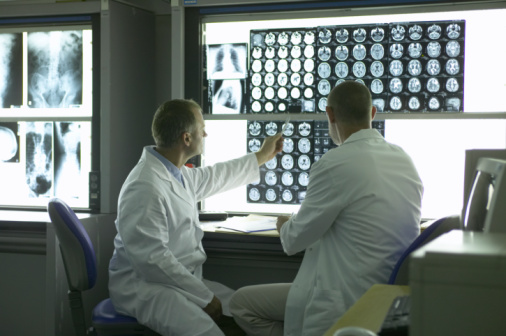Traumatic brain injury, often called TBI by medical professionals, can occur when a blow to the head causes damage to the brain. Millions of people suffer brain injuries in the U.S. each year, and nearly half of them are serious enough to require hospitalization.
According to the National Institutes of Health, more than 50 percent of all TBIs are the result of automobile accidents. Military personnel exposed to concussive forces are also at risk, and TBIs are associated with post-traumatic stress disorder. Victims of violent assault often suffer head injuries that result in TBI. Contact sports, such as football or boxing, can result in TBIs. Although some injuries are obvious and require immediate medical intervention, many brain injuries do not cause symptoms until days or even weeks after an incident.

People who suffer TBIs may experience anything from a change in physical sensation to extreme emotions. Movement and coordination, the ability to express thoughts with language, and even the way a person thinks can be affected. TBI patients often need lengthy rehabilitative therapy.
Luckily, there are many organizations, such as those mentioned below, which work together to do research and provide ongoing education into TBIs so that the medical community can increase the success rate of treatments.
The JHTR and COMBI Collaboration
The Brain Injury Association of America (BIAA), in an ongoing effort to increase health care access and treatment potential for TBI patients, has created a national network of medical professionals, research centers, advocacy councils and support groups. BIAA publishes an official journal, the Journal of Head Trauma Rehabilitation (JHTR), and January 2012 marks the first month of collaboration between the JHTR and the Center for Outcome Measurement in Brain Injury (COMBI).
The COMBI is itself a large collaboration, spearheaded by the Santa Clara Valley Medical Center’s Rehabilitation Research Center. The goal of the COMBI is to develop and promote standardized methods for assessing and describing TBIs. This online resource connects 16 different medical facilities that treat brain injuries. The data collected is used to support and educate healthcare professionals on the application of outcome measures for TBI.
How Will COMBI’s Efforts Benefit TBI Patients?
COMBI provides standardized forms, detailed training, background information, testing materials and a list of associated published studies for each referenced outcome measure. By partnering with the JHTR, the collaborative hopes to spread knowledge of standardized COMBI assessments and encourage their adoption for the treatment of all TBI patients.
Because of these efforts, doctors will use the same terms, measurements and scales when discussing TBI. By learning to speak the same language for TBI cases, researchers and practitioners will ensure the validity of comparisons drawn from different facilities and will be able to focus on the most effective treatment options available.
Contact Us
Patients with TBI, as well as their family members, face a lifetime of changes. Therapies are costly, support group opportunities are limited and affected individuals may no longer be able to function easily in daily life activities. Contact our experienced law firm today to make sure you receive all you are entitled to from insurance companies and responsible parties. Adequate finances can ensure that you and your loved ones receive the most up-to-date and effective treatments available for TBI.


